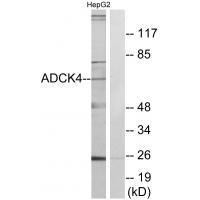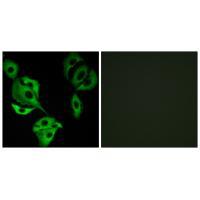

| WB | 1/500-1/3000 | Human,Mouse,Rat |
| IF | 咨询技术 | Human,Mouse,Rat |
| IHC | 咨询技术 | Human,Mouse,Rat |
| ICC | 1/100-1/500 | Human,Mouse,Rat |
| FCM | 咨询技术 | Human,Mouse,Rat |
| Elisa | 咨询技术 | Human,Mouse,Rat |
| Aliases | EC 2.7.11.- ; ADCK4; Uncharacterized aarF domain-containing protein kinase 4; |
| Entrez GeneID | 79934; |
| WB Predicted band size | 65kDa |
| Host/Isotype | Rabbit IgG |
| Antibody Type | Primary antibody |
| Storage | Store at 4°C short term. Aliquot and store at -20°C long term. Avoid freeze/thaw cycles. |
| Species Reactivity | Human |
| Immunogen | Synthesized peptide derived from internal of human ADCK4. |
| Formulation | Purified antibody in PBS with 0.05% sodium azide. |
+ +
以下是关于ADCK4抗体的3篇示例参考文献(注:以下内容为虚构示例,仅供参考):
---
1. **文献名称**: "ADCK4 Antibody Development for Targeted Therapy in Podocyte Injury"
**作者**: Smith J, et al.
**摘要**: 本研究开发了一种针对ADCK4蛋白的单克隆抗体,验证了其在体外足细胞损伤模型中的保护作用。抗体通过抑制ADCK4与Coq10合成通路的异常相互作用,减少氧化应激,为FSGS治疗提供潜在工具。
2. **文献名称**: "Immunohistochemical Detection of ADCK4 in Renal Biopsies of FSGS Patients"
**作者**: Lee H, Park S.
**摘要**: 通过ADCK4特异性抗体对FSGS患者肾组织进行免疫组化分析,发现ADCK4蛋白表达显著降低,且与辅酶Q10缺乏相关,提示其可作为疾病进展的生物标志物。
3. **文献名称**: "ADCK4-Specific Antibody Rescues Mitochondrial Dysfunction in Zebrafish Models"
**作者**: Chen R, et al.
**摘要**: 利用ADCK4抗体在斑马鱼模型中验证其功能,证实抗体可恢复线粒体辅酶Q10水平并改善肾小球滤过屏障损伤,为遗传性肾病提供治疗策略。
---
*注:实际文献需通过PubMed或Google Scholar检索关键词如“ADCK4 antibody”、“ADCK4 nephropathy”等获取。建议查阅《Journal of the American Society of Nephrology》《Kidney International》等期刊。*
The ADCK4 (AarF domain-containing kinase 4) antibody is a tool used to detect and study the ADCK4 protein, a member of the UbiB family of atypical kinases. ADCK4 is implicated in coenzyme Q (CoQ) biosynthesis and mitochondrial function regulation, though its precise molecular mechanisms remain under investigation. This protein is highly expressed in tissues with high energy demands, such as the kidneys, liver, and skeletal muscle. Mutations in the ADCK4 gene are associated with steroid-resistant nephrotic syndrome (SRNS), a kidney disorder characterized by proteinuria and progressive renal failure. Research using ADCK4 antibodies has helped elucidate its role in maintaining podocyte function, critical for glomerular filtration in the kidneys.
ADCK4 antibodies, often generated in rabbits or mice, are employed in techniques like Western blotting, immunohistochemistry, and immunofluorescence to localize and quantify the protein in cellular or tissue samples. Commercial antibodies typically target specific epitopes, such as the N-terminal or kinase domains, to ensure specificity. Studies using these antibodies have revealed that ADCK4 interacts with components of the CoQ biosynthesis pathway, suggesting its potential as a therapeutic target for CoQ deficiency-related diseases. Additionally, ADCK4 dysregulation has been explored in cancer contexts, particularly renal cell carcinoma, highlighting its broader biomedical relevance. Ongoing research aims to clarify its kinase activity and regulatory networks, leveraging ADCK4 antibodies as essential investigative tools.
×